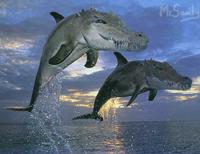Crichton and the broad scientific consensus on global warming
(I've been writing about this issue before here and here)
Almost everybody with a radio or television has heard, over and over again, that the earth is getting warmer.
Scientists who are knowledgable about paleoclimate are aware that the earth is still warming up from the "Little Ice Age" (which ended in the mid 1800's) and so it is rather a truism that we are experiencing "global warming". We have also recently experienced "global cooling".
Crichton is critized to be against science with his latest State of fear.
Crichton uses his book for making at least two substantive arguments:
First, Crichton argues, the scientific evidence for global warming is weak. We don't understand the complexities of global warming well enough to do anything but make educated guesses. The evidence of this warming trend relies on computer modeling of phenomena that are not well understood. For instance, we are not clear on exactly what the global effects of a 1 degree rise or a 5 degree rise may be. And we are not clear on how much cloud cover will change and what results that will have.
Crichton rejects many of the conclusions reached by the National Academy of Sciences and Intergovernmental Panel on Climate Change—for example, he does not believe that global temperature increases in recent decades are most likely the result of human activities.
Second, Crichton argues that concern about global warming is best understood as a fad. In particular, he argues that many people concerned about global warming follow a herd mentality, failing critically to examine the data. Crichton's critique extends more broadly to the news media, intelligentsia and general public.
I think, it's necessary to look upon pseudoscience (and science as well) with a critical eye, because human psychology can lead us into error and mistakes. My impression, is that Crichton is pro-science but with a critical eye. He wants more and better science to sharpen the picture of global warming.









<< Home